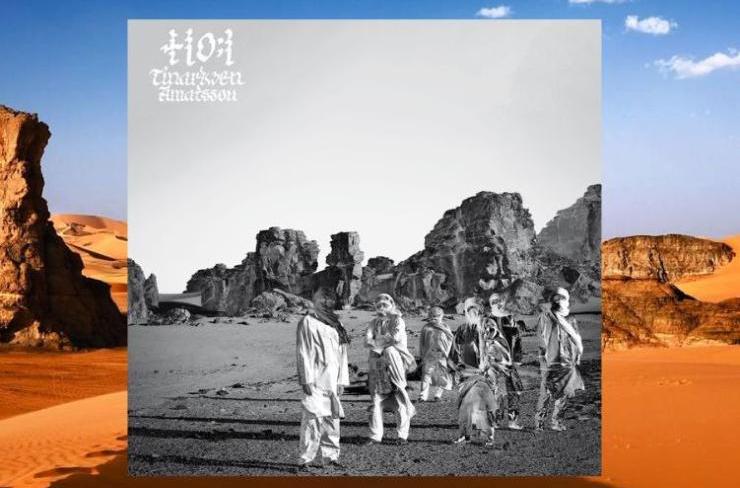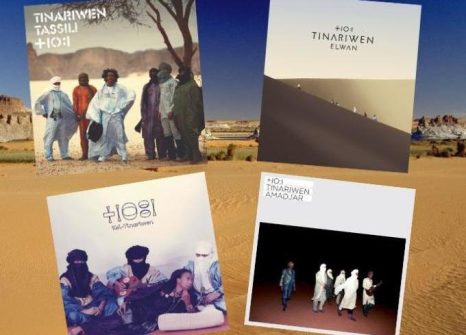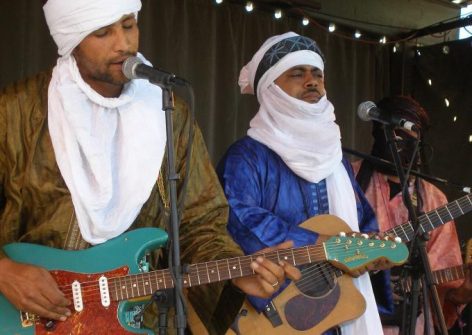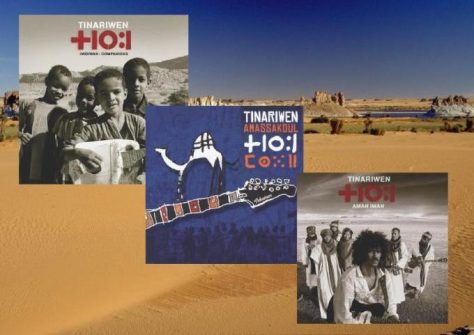Music. The Tinariwen. Beyond fear.

The music of the Malian group has the traits of blues, rock, world and traditional Tuareg music. Amatssou sings about exile, suffering and the pride of a people.
Inspired by Amatssou, Tinariwen’s latest album, the video by Swiss photographer Benoît Peverelli (viewable from the end of October on YouTube) shows Ibrahim Ag Alhabib, Abdallah Ag Alhousseyni and the other musicians of the famous Malian band moving in an almost rarefied atmosphere among the rocks of the Tassili n’Ajjer plateau, in southern Algeria, where they recorded the twelve songs of their latest work.
Suggestive images of sunrises in the desert, slow, solemn gestures that accompany the writing of sentences in Tifinagh in the sand, the wrapping of the white cheche around the head, or the fingers moving on the instruments. The music is intensely evocative, a few punctuated phrases speak of a dispersed Tuareg community, divided by wars and wish the brothers the power of understanding and the sisters
the splendour of tradition.

A refined video – Peverelli has also worked for Chanel, Louis Vuitton, Vogue – which makes you think about how many light years have passed since Tinariwen’s songs crossed oases and villages on cassettes, reproduced several times (the first “professional” recording was from 1992).The story of the legendary “Desert Boys” has been intertwined for decades with that of the Tuareg of Azawad, in northern Mali, and with their struggles for independence from the government of Bamako. Ibrahim Ag Alhabib, the founder, and other members of the band participated in the rebellion of the early 90s, creating the myth of the guerrillas with his guitar. Since their inception, Tinariwen have always sung about the exile, the suffering and the pride of a people who were masters of the great Saharan spaces for centuries before being colonized and divided by pointless borders.

Tinariwen in concert. CC BY 2.0/ Steve Terrell
Even in Amatssou, their ninth album released in May 2023, they denounce the abuses that the Tuareg population is forced to suffer, they attack those who have betrayed, but despite the difficulties of the present – the north of Mali is disputed between jihadist movements, terrorists of the Islamic State group and the Malian army supported by Wagner’s Russian mercenaries – invite us to stay united and move forward, “beyond fear” as the album title indicates in Tamasheq.
Since 2009, the year in which they created Imidiwan in Tessalit, a municipality in the north-east of Mali where Ibrahim and Hassan were born, they have no longer recorded in their country. Subsequent albums were composed in other deserts: Tassili in southern Algeria, Emman and Elwan in the Mojave in Joshua Tree and Amadjar in southern Morocco and Mauritania. For Amatssou they returned to the Algerian Tassili n’Ajjer, where they used the equipment of Imarhan, a Tuareg rock band that has a recording studio in Tamanrasset, the oasis (now a city) where the first group of Tinariwen was formed in 1979.

As usual, they made use of the collaboration of external musicians: Hicham Bouhasse of Imarhan, guitar and percussion, Miloudi Mad Chaghli, lute, as well as the female voices of Machar Aicha and Machar Fatimata who also play the tinde and the imzad (the single-string violin). Amar Chaoui contributed from Paris playing percussion, and from Nashville Wes Corbett’s banjo weaves a dialogue in the opening track Kek Alghalm with the “meandering” guitars typical of Malian desert blues. Also from Nashville, Fats Kaplin’s violin combines his melodic notes in Tenere Den and in three other songs. From Los Angeles Daniel Lanois, musician and producer (U2, Brian Eno, Peter Gabriel), has enriched Tinariwen’s sound with elements such as the pedal steel guitar, of the American country tradition, which do not distort but rather enhance their music. Above all, he deserves credit for having “stitched” together the various contributions in post-production. In the final song Tinde, the guitars and other instruments are silent, only the percussions accompany the voice of Machar Fatimata in a tribute to the Tuareg culture and the timeless beauty of nights around the campfire in the desert. (Open Photo: Amatssou album – Tinariwen website)
Anna Jannello



